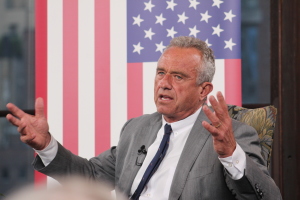Religious Minorities in Iraq Allegedly Suffering 'Slow Genocide'
The Christians of Iraq, along with other religious minorities, live in constant fear and face potential genocide, claims Gwendolen Cates, a Christian and documentarian who spent much of the last three years on the ground in Iraq.
Iraqi Christians want to stay in the country that is their ancestral home, Cates told The Christian Post. But in order to do so, they need the support of the international community. They are a segment of three religious minorities that face extinction and banishment, according to the filmmaker, together with Sabean Mandaean and Yazidi populations. These communities are native people of the land.
“It’s like the Native Americans,” Cates said. The Assyrian Christians are not Muslim converts; the ethnic group goes back to ancient Mesopotamia. The Assyrian nation was the first to convert to Christianity, sometime between 1 and 2 CE, according to the filmmaker.
On Dec. 16, Cates met with New York evangelical leaders and leaders of the New York Board of Rabbis, to argue that the vulnerable religious minorities might be wiped out of Iraq unless serious action is taken to protect them.
“The indigenous people of Iraq are being exterminated,” Cates appealed in a statement released to the press Friday. “Like the American Indians during colonization, the Tibetans, and the Jews in Soviet Russia and Nazi Germany, they are facing marginalization, persecution, forced assimilation and resettlement, and genocide.”
The minorities are being increasingly "ghettoized," with their land being taken, the filmmaker claims.
Iraq erupted into sectarian violence after the U.S. invasion in 2003, which was aiming to “liberate” the country from its nationalistic dictator, Saddam Hussein. Since then, non-Muslim minority communities have been systemically targeted by foreign fundamentalists who poured into the country.
That “elimination campaign” has been enabled by the Kurdish Regional Government and the Iraqi government, Cates says.
According to a recent study by Minority Rights Group International, only 500,000 Christians currently remain in Iraq, compared to between 800,000 and 1.4 million in 2003.
“Churches, villages, homes, and busloads of students have been bombed, and ancient Assyrian historic sites are being vandalized. Murder, rape, and kidnapping are epidemic," Cates says. “These are the communities that really want democracy; that are educated.”
Many people – not only the religious minorities – told her that life in Iraq was a lot better under Hussein.
“For all of Saddam’s many, many faults, he was a nationalist, he was a secularist. And that has changed,” Cates told CP.
Cates is the producer of a documentary about the cultural heritage and religious minorities of Iraq, “Mourning in the Garden of Eden,” which debuts in the Fall of 2012. She first went to Iraq as an embedded journalist in 2003. She has been working on the film since 2008 and after field research decided to focus on the endangered ancient communities.
Cates was in Iraq during Christmas 2010, not long after the Oct. 31 bombing of Our Lady of Salvation Church in Baghdad by Muslim extremists, which left 58 congregants dead. Cates was in the northern part of the country then, which used to be considered a haven for Christians. The entire Christian community there was still in mourning during Christmas.
Amnesty International condemned the act at the time as a war crime.
On Nov. 3, 2010, terrorists linked to al-Qaida publicly announced that all "infidels" in Iraq should be prepared to die. It started a period of even greater fear for Christians, Cates said, which is escalating now that U.S. troops are leaving the country.
“The mood is one of fear,” Cates told CP.
Cates’ referred CP to last year's sad holiday period in her film, in a clip titled “Christmas 2010.”
“Mourning in the Garden of Eden” focuses on the human stories of the persecuted minorities and that, with them gone, the connection to Iraq’s cultural heritage in ancient Mesopotamia will perish. Assyrian Christians are the largest religious minority. Assyrians today speak a modern dialect of Aramaic, the language of Jesus, and practice early traditions forgotten outside of Iraq.
Only 5 percent of members of the ancient culture of Sabean Mandaeans remain in the country, according to the movie. The group is known as followers of John the Baptist, also considered to be the last Gnostics. Their religious traditions revolve around baptism in flowing water and date back to pre-Christian times.
Another group that might disappear from Iraq, according to Cates, is the Yazidis. The remaining population is not only being persecuted, they are also reportedly undergoing coerced assimilation by the Kurds. The Yazidi also practice baptism as a sacrament.
Human Rights Watch blew the whistle on the subject in its 2009 report.
"Iraqi Christians, Yazidis, and Shabaks have suffered extensively since 2003," Joe Stork, deputy Middle East director at Human Rights Watch, said at the time. "Iraqi authorities, both Arab and Kurdish, need to rein in security forces, extremists and vigilante groups to send a message that minorities cannot be attacked with impunity."
The filmmaker is scared that after the withdrawal of U.S. troops even more violence will be taking place in the region, with nobody left to protect the vulnerable minorities. She recalled the recent attacks on Christian and Yazidi businesses in the North of the country, which was thus far considered a safe haven.
Many Christians and Sabean Mandaeans escape to neighboring Syria, Cates said, where they are now trapped in a volatile political crisis .




























